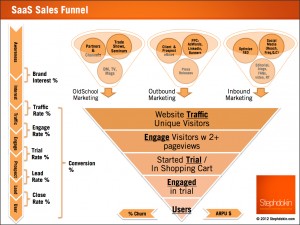
Figure 1. Software as a Service (Saas) sales funnel illustrates the importance of three types of customer loyalty: Retention, Advocacy and Purchasing. From Stephen King at stephdokin.com
Software as a Service (Saas) companies are particularly vulnerable to customer disloyalty. SaaS companies’ success depends on satisfying their customers on a regular basis or risk the possibility of loosing customers and engendering bad will in the marketplace. Consequently, customer experience management applies particularly well to Software as a Service companies due to the high-intensity nature of the recurring business model where you have to earn your clients loyalty on a monthly basis.
Three Ways SaaS Companies Make Money
There are three ways that businesses can make money. While the three ways can be applied to any business, they are particularly well-illustrated using SaaS companies (see Figure 1).
- Retention: The first way is to keep your existing customers. In Software as a Service companies, this is known as a subscription; and typically this subscription is collected on a recurring monthly basis.
- Advocacy: The second way is to acquire new customers. Hopefully, your existing customers are so excited about your product that they tell other people about it. Word of mouth creates viral growth for your company.
- Purchasing: The third way is to increase the amount of money you make from each customer (increasing average revenue per user – ARPU). With Software as a Service companies, that’s when a customer upgrades from one pricing tier to the next, but it can also be about selling additional products and services to the same customer.
Use Customer Feedback to Improve Customer Loyalty
To understand how to grow your business, you can use feedback from your customers as a means toward that end. At TCELab, we created the Customer Relationship Diagnostic (CRD), a Voice of Customer (VOC) survey. Based on years of applied research across a variety of industries (e.g., banking, healthcare, technology), the CRD was developed to help you efficiently measure the important areas about your customers’ experience : 1) the three dimensions of customer loyalty, 2) satisfaction with the customer experience, 3) your relative performance (within your industry), and company-specific variables. The CRD helps you identify where you can get the largest return on investment (ROI) across different improvement opportunities.
While our CRD-related web pages, infosheets and .PDFs are good, they do not seem to tell the whole story. Stephen King, our CEO, wanted to create an educational video to introduce our CRD product.
Just clocking in at just over 13 minutes, the video is necessarily comprehensive to really give the key background information about the CRD for clients asking us about the process. To help you zone in on the information you really want, the description of the video on YouTube provides a clickable index of the various sections. They appear below.
1:15 Your Typical Saas Management Team and Problem Statement
3:01 TCELab Product and Service Overview
3:34 ABC’s of the SaaS Sales Funnel
5:07 Three ways companies make money
5:54 RAPID Customer Loyalty in the SaaS Sales Funnel
6:41 What you get: Four main elements of a CRD Customer Survey
7:37 Explanation of Key Driver Analysis; The magic sauce of the CRD study
9:20 An Example of CRD Survey Data Key Driver Chart
10:30 The 6-step process of a CRD takes three months
With 4 main sections in the analysis, the CRD is used by Fortune 5000 firms to integrate customer feedback into C-Suite dashboards and strategic decisions, leading to accelerated revenue growth. We do this with science.
Enjoy the video. We are looking forward to helping your business.



![[Research Round-Up] The Latest From NetLine On B2B Content Consumption](https://customerthink.com/wp-content/uploads/email-g56aa02a47_1280-pixabay-email-marketing-218x150.png)